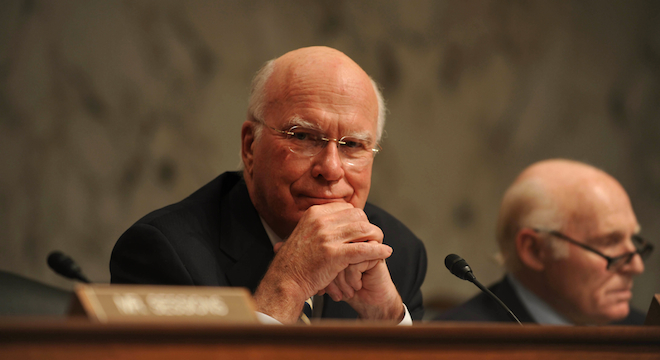The Senate Judiciary Committee on Thursday voted to approve a bill designed to bolster the privacy protections of Americans’ electronic communications, including everything from e-mail to Facebook messages and Tweets.
But the bill, which was introduced by Chairman Patrick Leahy (D-VT) to update older protections introduced in 1986, isn’t expected to be picked up again by the the full Senate, nor combined with House legislation, until 2013 at the earliest, sources close to the situation explained to TPM. Both of those would be necessary, along with the signature of the president, to become law.
That’s because the current session of Congress, the 112th, is due to adjourn January 3, 2013, and lawmakers remain preoccupied wrangling with the White House over the so-called fiscal cliff.
Still, Leahy celebrated the move on Thursday, and staffers told TPM they were confident that he could work together with the incoming House Judiciary Committee Chairman Bob Goodlatte (R-VA) and other Congressional Republicans to find mutually agreeable language for the final bill.
“After decades of the erosion of Americans’ privacy rights on many fronts, we finally have a rare opportunity for progress on privacy protection,” Leahy said in a statement published to his website after the markup hearing.
Sources close to the situation said they were uncertain when, if at all, the full Senate and Congress would put the bill — which amends the Electronic Communications Privacy Act (ECPA) — back on the calendar in 2013.
Leahy’s amendments include changes that would require law enforcement agencies to attain a probable cause warrant or subpoena in order to force companies to hand over any of a user’s electronic communications. Currently, a warrant is only necessary when agencies want to access communications newer than six months (180 days). Leahy’s bill also forbids companies from sharing user communications voluntarily with the government or law enforcement and says that they must notify users when they are turning information over (though agencies can obtain a court order for 90-day, renewable hold on notification).
The news is likely to come as a sour note to advocacy groups who praised the Senate for advancing the legislation on Thursday.
“This is an important gain for privacy,” read a statement from said Chris Calabrese, legislative counsel for the American Civil Liberties Union, emailed out after the Senate’s markup hearing. “We are very happy that the committee voted that all electronic content like emails, photos and other communications held by companies like Google and Facebook should be protected with a search warrant. We believe law enforcement should use the same standard to search your inbox that they do to search your home.”
“Activist group Demand Progress today hailed the Senate Judiciary’s passage of legislation to amend the 1986 Electronic Communications Privacy Act,” read one statement of support from the left-leaning advocacy group.
Leahy first attempted to introduce updates to ECPA back in May 2011. In the week prior to Thursday’s hearing, CNET published an article stating that revisions had been made to the bill that actually weakened privacy protections and permitted law enforcement agencies warrantless access to user communications, but Leahy’s office denied this was ever the case.
Correction: This article originally incorrectly stated that EPCA required court approval to access emails older than six months, when the reverse is true — court approval is only necessary for accessing emails less than six months (180 days) old. We have corrected the error in copy and apologize for it.






